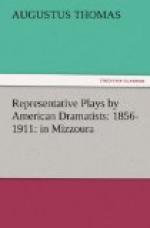purpose in writing these forewords is just a little
didactic; he addresses the novice who may be befuddled
after reading various “Techniques of the Drama,”
and who looks to the established and successful dramatist
for the secrets of his workshop. These prefaces
reveal Thomas as working more with chips than with
whole planks from a virgin forest. He confesses
as much, when he talks of “Mrs. Leffingwell’s
Boots.” It was “salvage,” he
writes, “it was the marketing of odds and ends
and remnants, utterly useless for any other purpose.”
Yet, with the technical dexterity, which is Mr. Thomas’s
strongest point, he pieced a bright comedy picture
together—a very popular one, too.
In the course of his remarks, he says, “When
I had the art department on the old St. Louis Republican—”
“There is an avenue of that name [Leffingwell]
in St. Louis, near a hill where I used to report railroad
strikes.” Similar enlightening facts dot
the preface to “In Mizzoura,” suggesting
his varied employment in the express and railroad
business. Thus, with personal odds and ends,
we can build a picture of Thomas before he started
on his regular employment as a playwright, in 1884,
with “Editha’s Burglar”, in conjunction
with Mrs. Frances Hodgson Burnett.
There is an autobiographical comment published, written presumably at the request of the late Hamilton Wright Mabie, which is not only worth preserving as a matter of record, but as measuring a certain facility in anecdote and felicity of manner which have always made Thomas a welcome chairman of gatherings and a polished after-dinner speaker.
“After Farragut ran the New Orleans blockade,” he states, “my father took direction of the St. Charles Theatre, New Orleans, then owned by Ben De Bar. When he returned to St. Louis, in 1865, I was in my seventh year, and my earliest recollections are tinged with his stories of Matilda Herron, John Wilkes Booth, and others who played in that theatre. Father was an orator of considerable ability, and I remember him, for the amusement of my mother, reciting long speeches from Kotzebue, Schiller, and Shakespeare. In his association with the theatre he took me very early to plays, and I have always been an attendant; consequently dialogue seemed the most natural literary vehicle. I found later that this impression was justified when I discovered that the most telling things in Homer and later Greek poets and philosophy were in dialogue—that this was true of Confucius and of Christ.
“I began writing plays when I was about fourteen years of age. When I was sixteen and seventeen, an amateur company that I organized played in certain railway centres on the old North Missouri Railway, for the benefit of local unions of the working men. In 1882, I made a dramatization of Mrs. Burnett’s ‘Editha’s Burglar’. With this as a curtain-raiser, and a rather slap-stick farce called ‘Combustion’, I made a tour of the country with a company I




